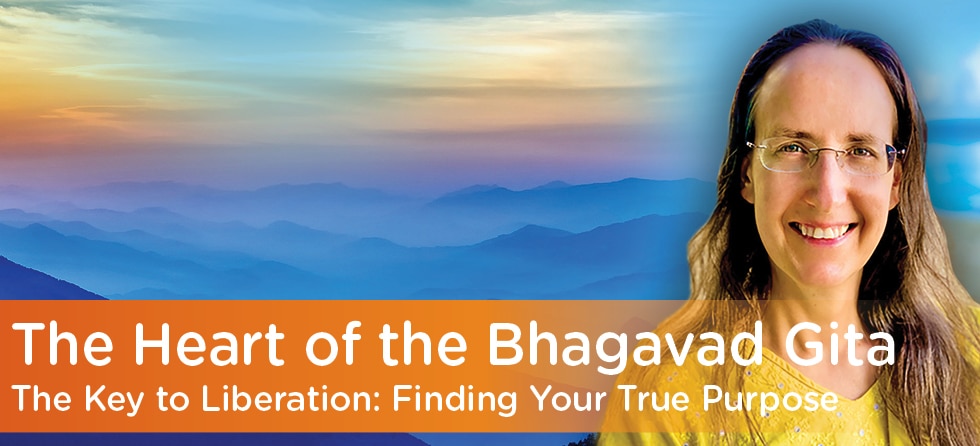The Heart of the Bhagavad Gita:
The Key to Liberation - Finding Your True Purpose
with Rukmini Chaitanya
12-WEEK LIVE ONLINE CERTIFICATION COURSE
January 21 – April 8, 2025 on Tuesdays 3:00 – 4:30 pm ET
Become part of our spiritual community and infuse your life with greater meaning and purpose every day!
Join this 12-week course and take the opportunity to deepen your understanding of the timeless teachings of the Bhagavad Gita!
Participate in live gatherings for a joyful spiritual experience amongst like minded people from all over the world. Or watch the recordings at your own time and contact Rukmini Chaitanya at any time with your questions and thoughts. The course is approved by the Yoga Alliance for Continuing Education Units (CEUs).
Join this upcoming course and tap into the timeless wisdom of the Gita’s final chapter.
The Bhagavad Gita (‘the Song of God’) is a spiritual dialogue between Lord Krishna and the warrior Arjuna, set on the battlefield of Kurukshetra. It teaches the paths of duty, devotion, and knowledge, emphasizing selfless action, inner peace, and the pursuit of spiritual liberation. The Gita offers timeless wisdom for living a righteous, purposeful life. It addresses fundamental questions about human purpose, ethical decision-making, and the pursuit of inner peace. The Gita’s teachings on selfless action, devotion, and the unity of all beings provide a roadmap for living a balanced and meaningful life. It transcends religious and cultural boundaries, offering universal wisdom relevant to people of all backgrounds. The Gita’s importance lies in its ability to inspire personal growth, moral integrity, and spiritual liberation, making it a cornerstone of spiritual literature.
Chapter 18 of the Bhagavad Gita, titled “Moksha-Sannyasa Yoga,” teaches the importance of performing one’s duty without attachment, the true meaning of renunciation, and the paths to liberation through selfless action, devotion, and knowledge. Krishna emphasizes surrender to the Divine as the ultimate path to inner peace and spiritual freedom.
This vital concluding chapter of the Gita contains several key teachings that summarize and integrate the spiritual wisdom of the entire text.

– The Bhagavad Gita, 18.66
Here are the main teachings:
Renunciation and the Threefold Nature of Action:
- Sannyasa (Renunciation) and Tyaga (Renunciation of the Fruits of Action): Krishna distinguishes between these concepts, teaching that true renunciation is not the abandonment of action but performing one’s duty without attachment to the results.
- Actions, knowledge, and the doer are categorized according to the three gunas (qualities): Sattva (goodness), Rajas (passion), and Tamas (ignorance).
Importance of Performing One’s Duty (Dharma):
- Krishna emphasizes the significance of following one’s own Dharma, even if it seems imperfect, over performing another’s duty well. Fulfilling one’s responsibilities according to their nature leads to spiritual growth and contentment.
Paths of Liberation (Moksha):
- Krishna explains that liberation can be achieved through the paths of Karma Yoga (selfless action), Bhakti Yoga (devotion), and Jnana Yoga (knowledge). These paths help individuals transcend the cycle of birth and death.
- Surrendering all actions to God with devotion leads to freedom from the bondage of karma and ultimate peace.
Surrender to the Divine:
- In his final instruction, Krishna advises Arjuna to abandon all forms of Dharma and take refuge in Him alone. This surrender to the Divine is the key to liberation, freeing one from all sins and leading to eternal peace.
Arjuna’s Resolve and Krishna’s Assurance:
- After receiving Krishna’s teachings, Arjuna’s doubts are dispelled, and he decides to fulfill his duty as a warrior without attachment.
- Krishna assures that wherever there is dedication to righteousness and divine guidance, there will be victory, prosperity, and morality.
Summary of the Gita’s Teachings:
- Chapter 18 synthesizes the central themes of the Bhagavad Gita, reinforcing the importance of living according to one’s Dharma, performing selfless actions, cultivating devotion, and pursuing knowledge to achieve spiritual liberation.
These teachings provide a comprehensive guide for leading a life of purpose, devotion, and spiritual fulfillment, culminating in the realization of one’s true self and union with the Divine.
What You Will Learn in this Course:
- Secrets of Selfless Action: – How to perform your duties without attachment. The teachings of Chapter 18 encourage the practice of selfless action, where one performs their duties without attachment to the results, leading to inner peace and spiritual growth.
-
Renunciation and Freedom: –The true meaning of renunciation and how it leads to spiritual liberation. The chapter reminds us that liberation is accessible through devotion, knowledge, and disciplined action in accordance with one’s Dharma.
-
Paths to Inner Peace: –How to integrate the Gita's wisdom into your daily life for lasting happiness.
-
The importance of Devotion and Self-surrender: –Krishna’s teachings underscore the importance of surrendering to the Divine and trusting in the greater cosmic order.
-
Live Q&A: –Answers to your questions and a deeper understanding of this sacred scripture and its teachings.
Join Rukmini on a deep dive into this profound spiritual text and you’ll gain the following further insights…
- Guidance on Life’s Challenges: The Bhagavad Gita provides profound insights into how to navigate the challenges and dilemmas of life. It offers practical advice on managing stress, making decisions, and living with integrity, making it relevant to people from all walks of life.
- Philosophical and Spiritual Wisdom: The Gita explores deep philosophical questions about the nature of the self, the universe, and the divine. It presents a comprehensive spiritual framework that helps individuals understand their place in the world and the interconnectedness of all life.
- Path to Inner Peace: The teachings of the Gita emphasize the importance of inner peace and mental discipline. It offers techniques like meditation, self-control, and mindfulness, which are essential for achieving a calm and focused mind in today’s fast-paced world.
- Moral and Ethical Guidance: The Gita addresses complex moral and ethical issues, offering a guide to righteous living (Dharma). It helps individuals make ethical choices and live in accordance with higher principles, leading to a more balanced and just society.
- Inspiration for Personal Growth: The Gita encourages personal development and self-improvement through its teachings on selflessness, devotion, and wisdom. It inspires individuals to cultivate virtues like humility, compassion, and courage, fostering personal and spiritual growth.
- Universal Relevance: Although rooted in Hindu philosophy, the Gita’s teachings transcend religious and cultural boundaries. Its messages about duty, action, and spirituality are universal, offering valuable lessons to people of all faiths and backgrounds.
- Blueprint for Spiritual Liberation: The Gita outlines various paths to spiritual liberation, including the paths of knowledge (Jnana Yoga), devotion (Bhakti Yoga), and selfless action (Karma Yoga). It provides a clear roadmap for those seeking spiritual enlightenment and freedom from the cycle of birth and death.
- Empowerment and Self-Realization: By studying the Gita, individuals gain a deeper understanding of their true nature and potential. It empowers them to realize their inner divinity and live a life of purpose, fulfillment, and joy.

The three main tenants of this course are
Connect, Study, Practice.
In Sanskrit we call them: Satsanga (association with spiritual people and teachers), Swadhyaya (Self Study or study of scriptures), Sadhana (Spiritual Practice)
SATSANGA
During this 12 week course you will connect with…
- Like-minded spiritual seekers from around the world.
- An experienced teacher whose life is dedicated to spiritual study and practice.
- An authentic living lineage of great yoga masters – Swami Sivananda, Swami Vishnudevananda, and Swami Swaroopananda. This lineage goes all the way back to the great 8th century saint Adi Shankaracharya. It goes back even further to Lord Narayana, the Supreme Being Himself.
- Lord Krishna, the Divine Incarnation and the Jagad Guru (teacher of the whole world), who is the in-dweller of your heart.
- The sacred dialogue between Lord Krishna and Arjuna, his beloved friend and disciple, the spiritual hero that represents all of us.
SWADHYAYA
During these 12 weeks, you will study from the Bhagavad Gita which is..
- The Song of God (because that which you are can only be described in poetry, not in prose).
- A revelation of the most profound, sublime, and soul-stirring spiritual truths.
- The rare secret of Yoga, Vedanta, Bhakti and Karma.
- Your great guide, supreme teacher, and the source of all wisdom.
- An inexhaustible spiritual treasure, a fountain of bliss, and ocean of knowledge.
SADHANA
Classes will include short practices of…
- Meditation — calming the mind, watching the breath, focusing within. This helps cultivate a sense of inner peace.
- Japa — silent repetition of Mantra, a sacred sound. This helps foster concentration.
- Kirtan — Chanting the Divine Name either alone or in a communal environment with the accompaniment of musical instruments; this boosts your energy reserves, helping you stay alert, awake, and aware throughout your daily activities for longer and with more joy.
- Students will be encouraged to practice Asana and Pranayama (yogic postures and breathing techniques) on their own time. You will also be asked to maintain a spiritual diary; you will have the option to share with Rukmini Chaitanya and receive spiritual guidance from her.
What people are saying about Rukmini Chaitanya…
Additional Information:
Offered as 12 weekly sessions – Tuesday Jan 21, 28, Feb 4, 11, 18, 25, March 4, 11, 18, 25, April 1 & 8 from 3:00 – 4:30 pm ET
This program is offered live through Zoom webinar with the availability for students to interact through Q&A with the presenter.
For enrolled students, a video recording will be available after each class in the event you miss a class or would like to review the content.
It is possible to register and take the course at any time. You can catch up on any classes you miss with the recordings.
Requirements and Recommendations:
- No experience necessary. This program is open to beginners as well as advanced practitioners.
- Viewing Device: Desktop or laptop computer will provide the best experience, although you can also connect via a tablet or smartphone.
- Internet connection: High-speed broadband wired or wireless is best.
- Video: Download Zoom to your computer, or install the Zoom app to your device. For interactive group sessions, a webcam or integrated camera will allow others to feel more connected with you.
- Audio: Headphone speakers are recommended. If you wish to participate vocally, a headset with a microphone will be ideal.
Course Includes:
- 18 hours of live video courses
- Bhagavad Gita – translation and commentary by Swami Sivananda
- Course Manual
More praise for Rukmini Chaitanya…

“Rukmini Chaitanya presents online courses in a variety of areas, based on the sublime scriptures and monistic non-dual Vedanta tradition in a clear, consistent, uplifting and most important loving way. Highly recommended for seekers of all walks of life.”
– Menas C. Kafatos, Quantum Physicist, Philosopher, Writer

Rukmini Chaitanya
Rukmini Chaitanya is a senior staff member of the Sivananda Ashram Yoga Retreat Bahamas, and the personal assistant to Swami Swaroopananda, the Acharya, or spiritual director of the Ashram. She regularly teaches the Bhagavad Gita during the Sivananda Yoga Teacher training as well as other courses on the Bhagavad Gita, Vedanta, positive thinking, meditation, and yoga philosophy.
Rukmini Chaitanya is known for her enthusiastic and inspiring teaching style as well as for her devotion to the lineage and the scriptures. She is dedicated to each of her students and has an innate desire to share knowledge with them. She brings a great deal of clarity to every topic and is highly appreciated for her capacity to unfold complicated topics and present them in a coherent and pure way.
